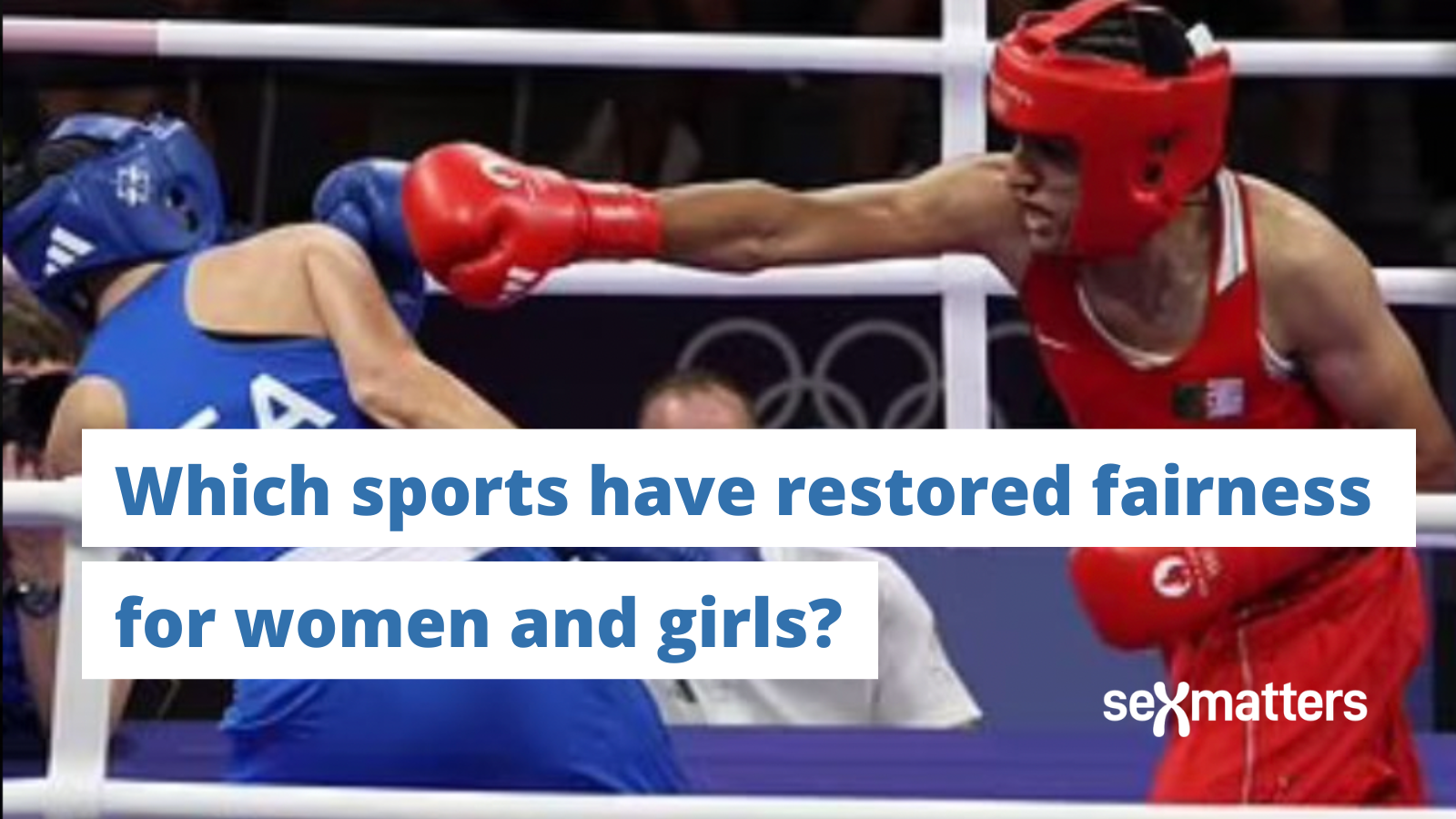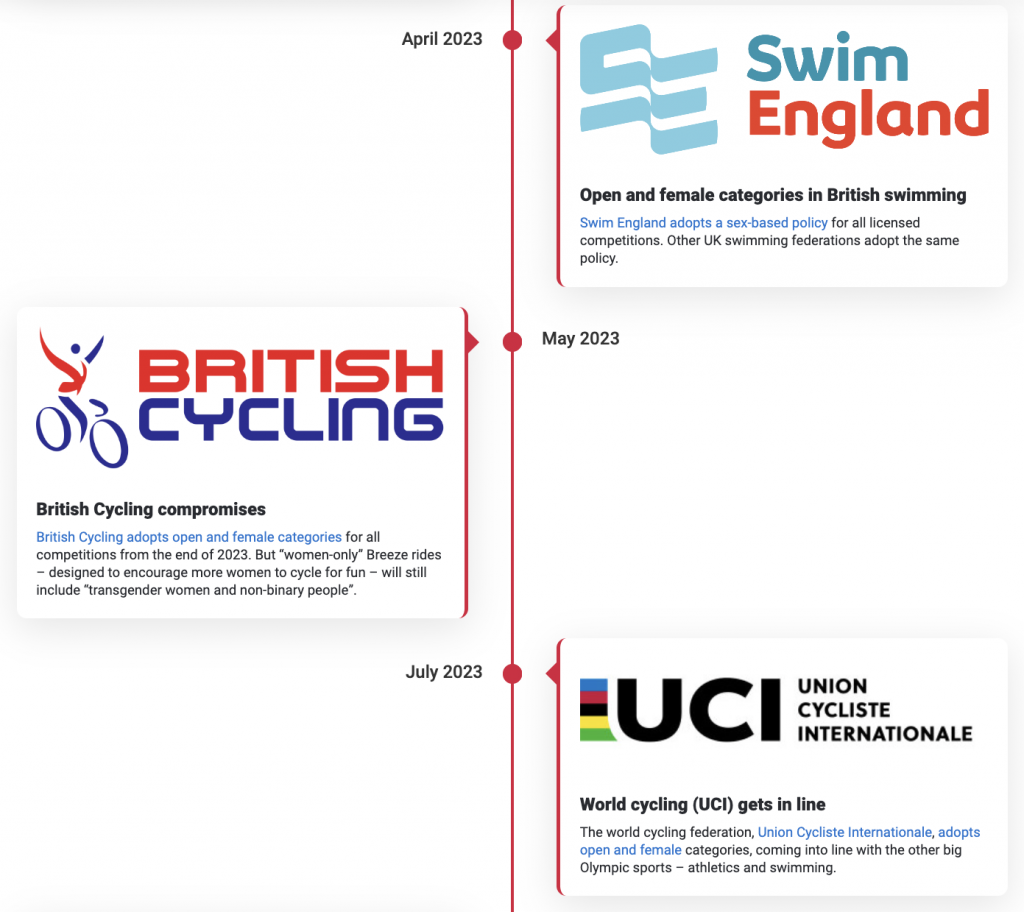Sports policies for competition
Which sports have restored fairness for women and girls?
Keep track of the state of play in both national and international sports.

These policies apply to competition, which is permitted under section 195 of the Equality Act to exclude all males from the women’s category, including those with the protected characteristic of gender reassignment. Many sports also have mixed sex events and non-competitive play, which are not included in these policies and which usually operate without restriction by sex or age.
United Kingdom – female category based on sex at birth
- American football
- Badminton (England only)
- Cricket (England and Wales)
- Cycling
- Fencing
- Football (England and Scotland)
- Hockey (England)
- Ice-hockey
- Karate (British but not English)
- Modern pentathlon
- Netball (England)
- Pickleball (England)
- Pool
- Rowing
- Rugby League and Rugby Union
- Sea-shore angling
- Swimming
- Triathlon
- Volleyball (England only)
- Waterski and wakeboard
- Wheelchair basketball.
United Kingdom – female category based on excluding any experience of male puberty
- Judo
- Orienteering.
Note that fairness for all girls requires a policy based on sex at birth, since sex differences are apparent before puberty.
United Kingdom – female category at some levels only
- Tennis – “specified” competition only; discretion for clubs to adopt the same rule for club competitions.
- Golf – Scratch golf tournaments are restricted to female at birth or no male puberty. All handicap competition is self-ID – anyone can register as female and obtain a handicap as “female”.
- Yachting/ sailing – competitions organised by the RYA will follow World Sailing’s policy, but the RYA guidance recognises that “clubs and classes organise the majority of racing in the UK” and, in allowing them to set their own eligibility criteria, encourages them not to “limit exclusion”.
At world level
- Athletics (World Athletics): “any part of male puberty either beyond Tanner Stage 2 or after age 12” – March 2023
- Boxing: World Boxing confirmed its previous position in 2023: sex at birth. The International Boxing Association is also sex-based but is no longer recognised by the International Olympic Committee (IOC), which took over the running of boxing at the Tokyo 2020 and Paris 2024 Olympics. World Boxing is now vying to replace the IBA for IOC recognition, so that it can run the boxing events at the next Olympic Games. It is not clear whether it would retain biological sex as the basis of competition or adopt the IOC policy of accepting passports as sufficient proof of eligibility. In many countries the sex marker on a passport can be changed on request or with a letter from a doctor (In the UK, a GP’s letter is enough.)
- Cricket (International Cricket Council): “any part of male puberty” – November 2023
- Cycling (Union Cycliste Internationale): “any part of male puberty either beyond Tanner Stage 2 or after age 12” – July 2023
- Golf: “any part of male puberty either beyond Tanner Stage 2 or after age 12” – December 2024
- Netball (World Netball): recorded as female at birth – April 2024
- Rowing: the word “gender” is replaced by “sex”, only those female at birth are eligible – March 2025
- Rugby union (World Rugby): no male puberty or effects of testosterone – October 2020
- Rugby league (International Rugby League): female at birth – July 2022
- Sailing (World Sailing): no-one who has experienced male puberty from Tanner stage 2 – May 2024
- Swimming and diving (World Aquatics): “any part of male puberty from Tanner stage 2” – 2022
- Weightlifting (International Weightlifting Federation): no-one who has experienced male puberty – August 2023
The state of play in other sports
Athletics: UK Athletics announced an intention to adopt Open and Female categories in March 2023, following the World Athletics position, but has not written a policy. Many male runners continue to register as women and compete in races athough this is against the stated policy of UK Athletics. The board of UK Athletics was due to review and progress its policy in March 2025.
Football: FIFA is still “reviewing” current policy. FIFA policy is from 2011 and refers to men’s and women’s football, without sex definitions (likely they did not anticipate these would be needed).
In the UK, archery, basketball, gymnastics, snowsport and weightlifting all state that they are reviewing.
In England, boxing and kendo were always sex-based. British Judo changed in December 2023. All the other combat sports have still to sort this out.
UK vs international policies
Some UK governing bodies have said they must follow their world body. Others have followed in the past but now set a different policy on this issue. This applies in both directions. For example:
- World Netball, World Sailing, and the International Cricket Council protected the female category but UK bodies did not follow for some time. Some, like Football Association Wales, and cricket in Scotland, have still not.
- Several UK and England bodies have moved ahead of their international federations to restore fairness for females, including the British American Football Association, Badminton England, British Judo, British Rowing, British Triathlon and Volleyball England.
- The UK’s rugby authorities took almost two years to follow the policy adopted by World Rugby based on evidence about the increased injury risk for women facing male players.
History of policy changes
For a full history of policy changes, see our Sports timeline
Here’s how facing a crisis pushed the biggest sports to act.

